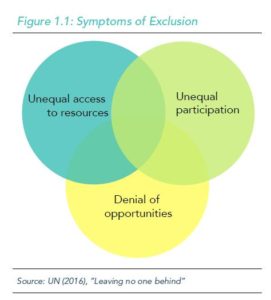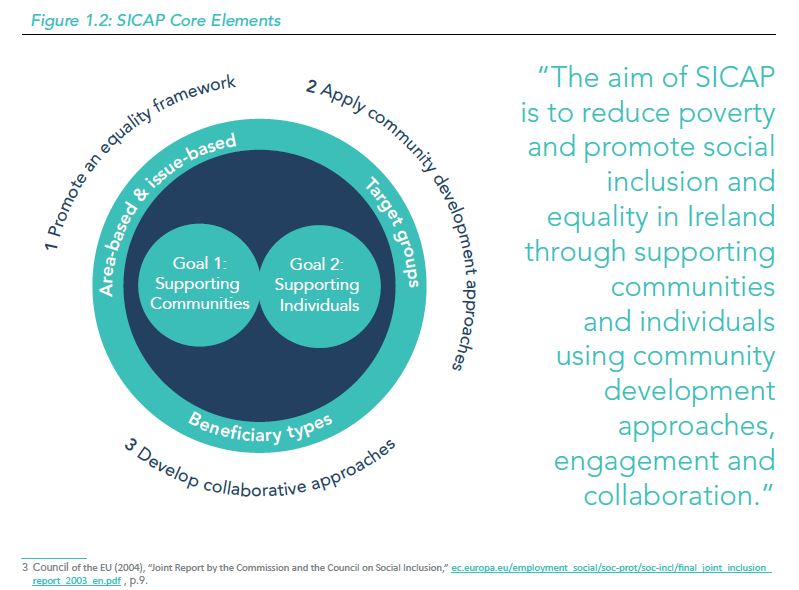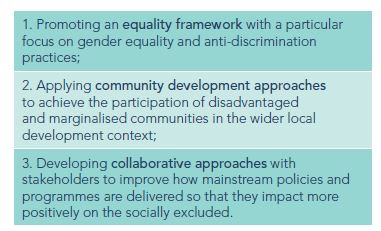
Social Inclusion & Community Activation Programme


The Social Inclusion and Community Activation Programme (SICAP) 2018 – 2022 provides funding to tackle poverty and social exclusion at a local level through local engagement and partnerships between disadvantaged individuals, community organisations and public sector agencies. SICAP 2018 – 2022 is the successor programme to SICAP 2015 – 2017.
SICAP is a social inclusion programme which assists both individuals and groups through a two-pronged approach; supporting communities and supporting individuals. The task of Programme Implementers (PIs) is to reflect the broad scope of the programme in their actions and use programme funding to strengthen communities and improve people’s lives. SICAP aims to address high and persistent levels of deprivation through targeted and innovative, locally led approaches. It targets and supports those who are disadvantaged in Irish society and less likely to use mainstream services.
PIs engage with marginalised communities and service providers using a community development approach to address issues relating to social exclusion and inequality. It enables bottom-up approaches within the framework of a national programme which provides targets, performance indicators and requirements.
Programme Details:
Delivery Structure
SICAP is managed locally by 33 Local Community Development Committees (LCDCs) with support from Local Authorities. Programme actions are delivered by PIs across 51 Lots.
Duration
SICAP operates from 1st January 2018 to 31st December 2022. The LCDC reserves the right to extend SICAP for up to 12 months (with a maximum of one such extension) on the same terms and Conditions, subject to their legal obligations and subject to approval from the Department of Rural and Community Development (DRCD).
Funding
SICAP is funded by the Department of Rural and Community Development with co-funding from the European Social Fund (ESF) as part of the ESF Programme for Employability, Inclusion and Learning 2014-2020. Continued funding for PIs is subject to a satisfactory annual performance review Funding levels are set annually and are subject to change.
European Social Fund
The ESF Programme for Employability, Inclusion and Learning (PEIL) 2014-2020 is co-financing SICAP in the years 2018-2020. PEIL’s priority areas for investment revolve around the activation of the unemployed, social and labour market inclusion, education and youth employment. Under PEIL 2014-2020 Priority 2, the allocation for SICAP is €60m. It is important to note that ESF rules will apply to SICAP
Influencing Factors
The programme structure has been set by the Department of Rural and Community Development and has been influenced by a number of factors:
- National government policy and priorities;
- Ireland’s changing social and economic landscape, particularly reduced unemployment levels and a general economic recovery;
- Learning from SICAP 2015 – 2017 and findings from the 2017 national consultation process;
- Findings from a series of evaluations by the Economic and Social Research Institute (ESRI) on
- particular SICAP components. This included an exploration of area-based training provision, an
- examination of SICAP goals and governance, and a spatial examination of targeting.
Local Economic and Community Plans 

SICAP actions must underpin what has been identified in the Local Economic and Community Plan (LECP) at county level, reflecting the priorities of the LCDC. LECPs were drafted following a consultation process in each county and are the collective response to locally identified needs. SICAP has a limited budget and PIs should prioritise SICAP work by taking into account the key social inclusion objectives of the LECP. A mid-term review has been built into LECPs with these scheduled to take place in 2018/2019. SICAP actions should be shaped by any updates to the LECP and additional needs identified.
Social Inclusion
Social inclusion is a process which ensures that those at risk of poverty and social exclusion gain the opportunities and resources necessary to participate fully in economic, social, political and cultural life and to enjoy a standard of living that is considered normal in the society in which they live. It ensures that they have greater participation in decision making which affects their lives and access to their fundamental rights.3 Social inclusion works for a fairer future that benefits everyone. SICAP supports and promotes social inclusion and inclusive development.


of improving the terms of participation in society for people who are disadvantaged on the basis of age, sex, disability, race, ethnicity and economic and migration status”. 4 Promoting social inclusion equires both removing barriers to people’s participation, including certain laws, policies and institutions as well as discriminatory attitudes and behaviours, and taking active steps to make such participation easier.
Programme Aim
The aim of SICAP is to reduce poverty and promote social inclusion and equality in Ireland through supporting communities and individuals using community development approaches, engagement and collaboration.
Programme Goals
Goal 1: Supporting Communities
To support communities and target groups to engage with relevant stakeholders in identifying and addressing social exclusion and equality issues, developing the capacity of Local Community Groups, and creating more sustainable communities.
Goal 2: Supporting Individuals
To support disadvantaged individuals to improve the quality of their lives through the provision of lifelong learning and labour market supports.
Horizontal Themes
Horizontal themes are the core principles that cut across all areas of PIs’ work. SICAP is underpinned by three horizontal themes:
PIs must incorporate the horizontal principles into their SICAP strategic and annual planning processes and in how they engage with individuals and LCGs and other stakeholders.
An Equality Framework
The Equal Status Acts 2000 to 2015 are based on the principle that everyone has an equal right to participate in our society. In delivering SICAP, Progamme Implementers should ensure that individuals (or groups of individuals) are treated fairly and equally and no less favourably, specific to their needs. Under the Equal Status Act it is illegal to discriminate on the grounds of gender, marital status, family status, sexual orientation, religion, age, disability, race and membership of the Traveller community. People should not be denied access to services, facilities or amenities, everyone should be seen as being of equal worth and should be treated on merits and not on the basis of a prejudice or stereotype.
Equality work refers to work that can be described as having outcomes which promote a more equal society. SICAP seeks to promote an equality framework with a particular focus on gender equality and anti-discriminatory practices. PIs have to ensure that equality work is carried out with LCGs and individuals, as well as making sure that it is reflected in their own internal practices.
Gender Equality
Gender equality is achieved when women and men enjoy the same rights and opportunities across all sectors of society, including in economic participation and decision-making, and when the different behaviours, aims and needs of women and men are equally valued and favoured.6 To achieve gender equality, the different needs of men and women must be recognised. Some women may experience double or cumulative disadvantage as a result of being a woman and being a member of a SICAP target group or a disadvantaged community. Increased engagement with women will support the cross-cutting equality horizontal theme to promote an equality framework. PIs must reflect on their human resource processes to tackle unconscious gender bias and to create a workplace where both women and men can advance into leadership positions.
Community Development
Actions across both goals must be underpinned by community development approaches and principles. Community development is defined as “a developmental activity comprised of both a task and a process. The task is social change to achieve equality, social justice and human rights, and the process is the application of principles of participation, empowerment and collective decision making in a structured and co-ordinated way. Community development principles are in line with the three stage community development matrix
A community development approach ensures that the capacity of communities and target groups is developed so that they will have the opportunity to input and determine the core needs that SICAP actions should be responding to. A community development approach also increases the participation of those who are the most marginalised by engaging people through pre-development mechanisms such as outreach work. PIs must ensure that their own governance and decision making structures are reflective of community development principles and that SICAP target groups are participating in decisions that determine the work of SICAP locally.
Collaborative Approaches
PIs must develop a collaborative approach in their delivery of SICAP in order to increase the sustainability of the work and grow the potential to mainstream initiatives piloted through SICAP. SICAP focuses on the synergies to be achieved between it and other national, regional and local strategies and plans for social inclusion, activation and community development. It is critical that PIs collaborate with other service providers to ensure ongoing progression for those most marginalised and that LCDCs play their part in enabling and supporting this. Collaborative approaches can reduce overlap and duplication in service provision and thus ensure greater value for money for the Exchequer, and over the longer term can reduce dependency on SICAP funding.
Local Flexibility
PIs and LCDCs understand the needs of the target groups and local communities. This is vital in determining the types of interventions and actions that are needed from SICAP in order to improve people’s lives and strengthen communities. Diverse challenges face local communities across Ireland and SICAP needs to be able to respond accordingly. SICAP offers PIs and LCDCs the flexibility to jointly target supports to particular groups and to respond to issues which have emerged in their delivery areas. SICAP is a national programme that can be tailored locally to best meet the needs of disadvantaged areas and target groups on the ground. However, it is important to stress that the programme is unable to, and is not expected to, provide a response to all the issues and barriers faced by individuals living in our communities.


The Department of Rural and Community Development
The Department of Rural and Community Development is the lead and funding department in relation to SICAP. The Department channels funding to LCDCs through the Local Authorities. It sets policy priorities, targets, the policy context and is the final arbiter in respect of the programme. The Department is a designated intermediate body under the ESF PEIL 2014-2020 with specific responsibilities in relation to the ESF funding.
Pobal
Pobal acts as the agent of the Department of Rural and Community Development with respect to national management and oversight of the programme, which includes co-funding under the European Social Fund (ESF). Pobal managed the set-up and design of the programme on behalf of the Department. Its functions include monitoring programme data and preparing progress reports for the Department, and it assists with the management and delivery of SICAP. Pobal provides capacity building supports to PIs and LCDCs to assist them in bringing quality standards to the programme. It carries out technical checks as part of performance reviews and the annual planning process. Pobal is not a direct party to the Funding Agreement between the LCDCs and PIs.
Local Community Development Committee
Local Community Development Committees (LCDCs) are the Contracting Authority. There are 33 LCDCs nationally and each manages SICAP at a local level and directs funding to PIs. LCDCs were established by Government under the Local Government Reform Act 2014 to bring about a more coordinated approach to local and community development. LCDCs are the key decision-makers in terms of annual planning, monitoring and oversight. They are responsible for monitoring PIs’ compliance through financial management and performance monitoring, and have responsibility for the bi-annual performance reviews and the annual planning process. LCDCs are the beneficiary body for ESF co-financing and have responsibilities in relation to the management and reporting of that co-financing. As beneficiary bodies, the LCDCs are responsible for preparing the relevant financial and non-financial data declarations in relation to the PEIL 2014-2020.
Local Authority
Local Authorities support their respective LCDCs in managing the programme and provide administrative supports. Each Local Authority is a party to a Funding Agreement and, subject to the approval of the LCDC, administers the SICAP bank account and issues payments to the PI. It has a role in relation to reviewing and enforcing the obligations of the PI.
Programme Implementer
PIs deliver SICAP at a local level as per their annual plan. They report to the LCDC on their progress in carrying out these actions, their work with beneficiaries, the targets achieved and ongoing financial activity. They engage with the programme target groups and record and monitor their ongoing performance.


